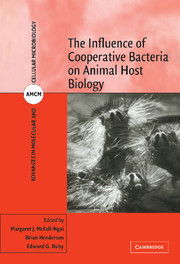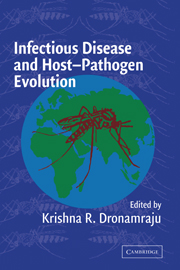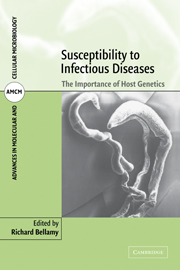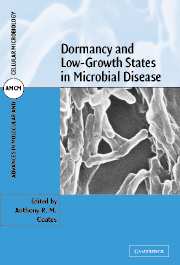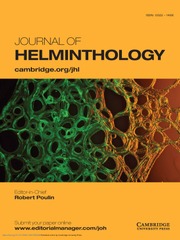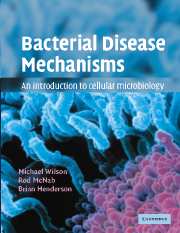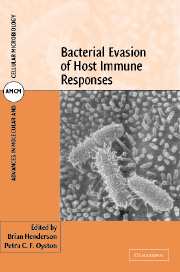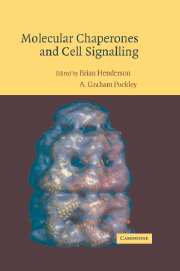The Influence of Cooperative Bacteria on Animal Host Biology
Ninety percent of the cells in the human body are bacteria, and humans may be host to many thousands of different species of bacteria. These striking statistics are part of a new paradigm in microbiology in which bacteria are no longer viewed as disease-causing killers but more as lifelong partners which are often essential for the survival of their host. This book brings together a group of diverse scientists - evolutionary biologists, immunologists, molecular biologists, microbiologists, pathologists and mathematicians - to discuss the evolution and mechanisms of bacteria-host interactions at all levels of complexity. Chapters deal with the evolution of these interactions over the last 60 years (since the introduction of antibiotics) to a period of 3.8 billion years (since the evolution of single-celled life) and discuss bacterial interactions with multicellular life forms from coral reefs to humans. Researchers and graduate students across the life sciences will find this book of interest.
- First book to deal with the biology, including evolutionary biology and pathobiology, of bacterial interactions with their hosts
- Covers a broad range of hosts from coral reefs to humans
- Provides an interdisciplinary approach to this subject for the first time, with contributions from leading experts worldwide
Reviews & endorsements
'The title of this collection of reviews hints at a refreshing new angle regarding the interplay between a range of hosts and their associated bacterial communities.' Microbiology Today
'This work is strongly recommended to all bacteriologists, immunologists, general microbiologists, biologists, zoologists, epidemiologists and ecologists.' Immunological Investigations
Product details
November 2005Hardback
9780521834650
454 pages
229 × 152 × 25 mm
0.77kg
58 b/w illus. 13 colour illus. 10 tables
Available
Table of Contents
- Part I. Evolutionary Biology of Animal Host-Bacteria Interactions:
- 1. How have bacteria contributed to the evolution of multicellular animals? Carol Hickman
- 2. The interface of microbiology and immunology: a comparative analysis of the animal kingdom Margaret McFall-Ngai
- 3. Co-evolution of bacteria and their hosts: a marriage made in heaven or hell? Jörg Hacker, Ulrich Dobrindt, Michael Steinert, Hilde Merkert and Ute Hentschel
- 4. Industrial revolution and microbial evolution Fernando de la Cruz and Julian Davies
- 5. Bacteria evolve and function within communities: observations from experimental Pseudomonas populations Paul B. Rainey
- Part II. Bacterial Ecology and the Host as an Environment:
- 6. Coral symbioses: the best and worst of three kingdoms Eugene Rosenberg
- 7. Interactions between inherited bacteria and their hosts: the Wolbachia paradigm Zoe L. Veneti, Max Reuter, Horacio Montenegro, Emily A. Hornett, Sylvain Charlat and Gregory D. Hurst
- 8. Microbial communities in lepidopteran guts: from models to metagenomics Jo Handelsman, Courtney J. Robinson and Kenneth B. Raffa
- 9. Commensal diversity and the immune system: modelling the 'host-as-network' Robert M. Seymour
- Part III. Cellular Interactions at the Bacteria-Host Interface:
- 10. Beneficial intracellular bacteria in the Dryophthoridae: evolutionary and immunological features of a pathogenic-like relationship Abdelaziz Heddi and Caroline Anselme
- 11. Regulation of Bordetella-host interactions: mechanisms and evolution Seema Mattoo and Jeff F. Miller
- 12. Resident bacteria as inductive signals in mammalian gut development Lora V. Hooper
- 13. Virulence or commensalism: lessons from the urinary tract Göran Bergsten, Björn Wullt and Catharina Svanborg
- Part IV. Bacterial Interactions with the Immune System:
- 14. Host responses to bacteria: innate immunity in invertebrates L. Courtney Smith
- 15. Bacterial recognition by mammalian cells Clare E. Bryant and Sabine Tötemeyer
- 16. Moonlighting in protein hyperspace: shared moonlighting proteins and bacteria-host crosstalk Brian Henderson
- 17. Cell signalling pathways as targets for bacterial evasion and immunity Andrew N. Neish
- 18. Shaping the bacterial world by human intervention Rino Rappuoli.

